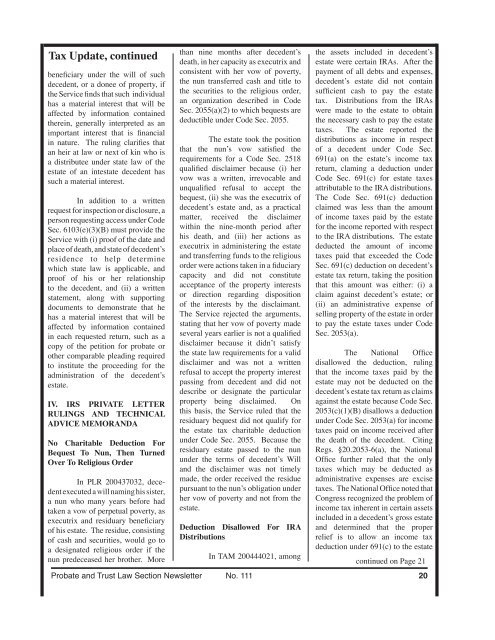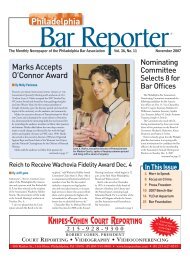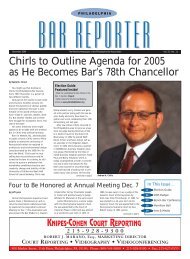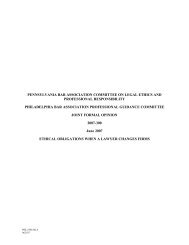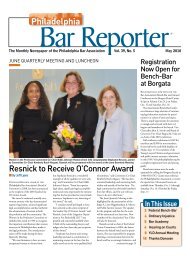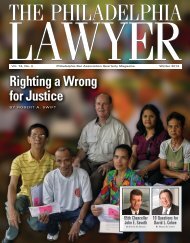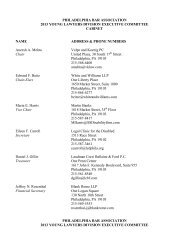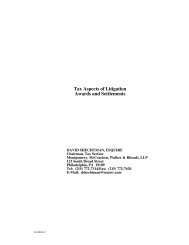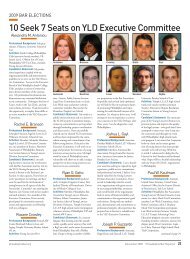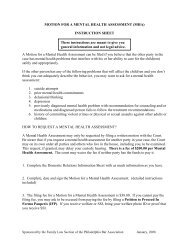Probate & Trust Newsletter: April 2005 - Philadelphia Bar Association
Probate & Trust Newsletter: April 2005 - Philadelphia Bar Association
Probate & Trust Newsletter: April 2005 - Philadelphia Bar Association
You also want an ePaper? Increase the reach of your titles
YUMPU automatically turns print PDFs into web optimized ePapers that Google loves.
Tax Update, continued<br />
beneficiary under the will of such<br />
decedent, or a donee of property, if<br />
the Service finds that such individual<br />
has a material interest that will be<br />
affected by information contained<br />
therein, generally interpreted as an<br />
important interest that is financial<br />
in nature. The ruling clarifies that<br />
an heir at law or next of kin who is<br />
a distributee under state law of the<br />
estate of an intestate decedent has<br />
such a material interest.<br />
In addition to a written<br />
request for inspection or disclosure, a<br />
person requesting access under Code<br />
Sec. 6103(e)(3)(B) must provide the<br />
Service with (i) proof of the date and<br />
place of death, and state of decedentʼs<br />
residence to help determine<br />
which state law is applicable, and<br />
proof of his or her relationship<br />
to the decedent, and (ii) a written<br />
statement, along with supporting<br />
documents to demonstrate that he<br />
has a material interest that will be<br />
affected by information contained<br />
in each requested return, such as a<br />
copy of the petition for probate or<br />
other comparable pleading required<br />
to institute the proceeding for the<br />
administration of the decedentʼs<br />
estate.<br />
IV. IRS PRIVATE LETTER<br />
RULINGS AND TECHNICAL<br />
ADVICE MEMORANDA<br />
No Charitable Deduction For<br />
Bequest To Nun, Then Turned<br />
Over To Religious Order<br />
In PLR 200437032, decedent<br />
executed a will naming his sister,<br />
a nun who many years before had<br />
taken a vow of perpetual poverty, as<br />
executrix and residuary beneficiary<br />
of his estate. The residue, consisting<br />
of cash and securities, would go to<br />
a designated religious order if the<br />
nun predeceased her brother. More<br />
than nine months after decedentʼs<br />
death, in her capacity as executrix and<br />
consistent with her vow of poverty,<br />
the nun transferred cash and title to<br />
the securities to the religious order,<br />
an organization described in Code<br />
Sec. 2055(a)(2) to which bequests are<br />
deductible under Code Sec. 2055.<br />
The estate took the position<br />
that the nunʼs vow satisfied the<br />
requirements for a Code Sec. 2518<br />
qualified disclaimer because (i) her<br />
vow was a written, irrevocable and<br />
unqualified refusal to accept the<br />
bequest, (ii) she was the executrix of<br />
decedentʼs estate and, as a practical<br />
matter, received the disclaimer<br />
within the nine-month period after<br />
his death, and (iii) her actions as<br />
executrix in administering the estate<br />
and transferring funds to the religious<br />
order were actions taken in a fiduciary<br />
capacity and did not constitute<br />
acceptance of the property interests<br />
or direction regarding disposition<br />
of the interests by the disclaimant.<br />
The Service rejected the arguments,<br />
stating that her vow of poverty made<br />
several years earlier is not a qualified<br />
disclaimer because it didnʼt satisfy<br />
the state law requirements for a valid<br />
disclaimer and was not a written<br />
refusal to accept the property interest<br />
passing from decedent and did not<br />
describe or designate the particular<br />
property being disclaimed. On<br />
this basis, the Service ruled that the<br />
residuary bequest did not qualify for<br />
the estate tax charitable deduction<br />
under Code Sec. 2055. Because the<br />
residuary estate passed to the nun<br />
under the terms of decedentʼs Will<br />
and the disclaimer was not timely<br />
made, the order received the residue<br />
pursuant to the nunʼs obligation under<br />
her vow of poverty and not from the<br />
estate.<br />
Deduction Disallowed For IRA<br />
Distributions<br />
In TAM 200444021, among<br />
the assets included in decedentʼs<br />
estate were certain IRAs. After the<br />
payment of all debts and expenses,<br />
decedentʼs estate did not contain<br />
sufficient cash to pay the estate<br />
tax. Distributions from the IRAs<br />
were made to the estate to obtain<br />
the necessary cash to pay the estate<br />
taxes. The estate reported the<br />
distributions as income in respect<br />
of a decedent under Code Sec.<br />
691(a) on the estateʼs income tax<br />
return, claming a deduction under<br />
Code Sec. 691(c) for estate taxes<br />
attributable to the IRA distributions.<br />
The Code Sec. 691(c) deduction<br />
claimed was less than the amount<br />
of income taxes paid by the estate<br />
for the income reported with respect<br />
to the IRA distributions. The estate<br />
deducted the amount of income<br />
taxes paid that exceeded the Code<br />
Sec. 691(c) deduction on decedentʼs<br />
estate tax return, taking the position<br />
that this amount was either: (i) a<br />
claim against decedentʼs estate; or<br />
(ii) an administrative expense of<br />
selling property of the estate in order<br />
to pay the estate taxes under Code<br />
Sec. 2053(a).<br />
The National Office<br />
disallowed the deduction, ruling<br />
that the income taxes paid by the<br />
estate may not be deducted on the<br />
decedentʼs estate tax return as claims<br />
against the estate because Code Sec.<br />
2053(c)(1)(B) disallows a deduction<br />
under Code Sec. 2053(a) for income<br />
taxes paid on income received after<br />
the death of the decedent. Citing<br />
Regs. §20.2053-6(a), the National<br />
Office further ruled that the only<br />
taxes which may be deducted as<br />
administrative expenses are excise<br />
taxes. The National Office noted that<br />
Congress recognized the problem of<br />
income tax inherent in certain assets<br />
included in a decedentʼs gross estate<br />
and determined that the proper<br />
relief is to allow an income tax<br />
deduction under 691(c) to the estate<br />
continued on Page 21<br />
<strong>Probate</strong> and <strong>Trust</strong> Law Section <strong>Newsletter</strong> No. 111 20


